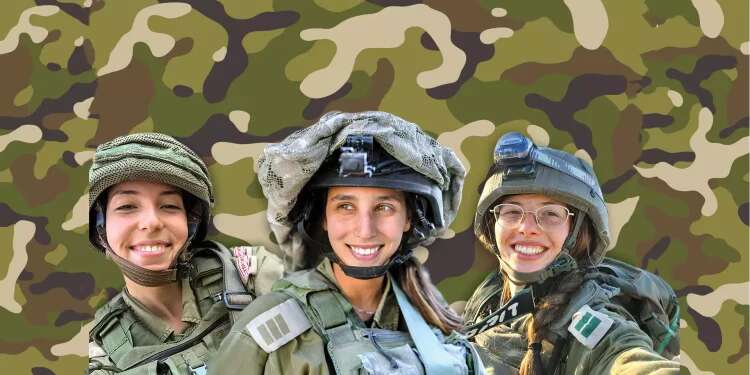Bar, a battalion doctor, spent sixty consecutive hours in a tank on the Gaza front, providing life-saving medical care to IDF soldiers. Ella, a paramedic who was drafted as a reservist the day after the brutal Hamas attack on southern Israel, saved the lives of two wounded battalion commanders and two fighters, in one such case while in a crowded tank. And Shaked, also a paramedic on reserve duty, entered the Gaza Strip on foot carrying a heavy bag with supplies and treated four soldiers while under fire.
Follow Israel Hayom on Facebook, Twitter, and Instagram
The three courageous women are part of a group of 70 female medical professionals who fight alongside IDF forces in Gaza. In an interview with Israel Hayom, conducted shortly after the Israel-Hamas ceasefire expired and the fighting resumed, they speak of leaving their homes, families, and occupations behind to engage in the most meaningful activity – saving the lives of IDF soldiers until victory is achieved. But unfortunately, this week, Bar and Ella's battalions suffered painful losses.
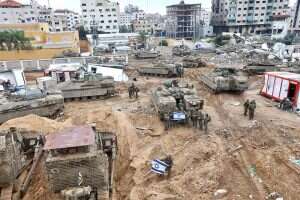
Lt. Bar, 27, is a career soldier and senior medical officer of the 53rd Armored Battalion. Her husband, Idan, is a Home Front Command reservist.
She's been home in Ramat Gan only once since the start of the war, after 28 days on the front line. "In the past, I participated in operational activity in the Judea and Samaria Division, but in the current war I took care of the wounded under fire for the first time," she shares.
Bar joined the military in 2015, first in the human resources department, but then decided to fulfill her childhood dream and studied medicine at Hebrew University as part of a top reservist program. "The IDF is in dire need of doctors, which is why they allowed me to study, and half a year ago I became a senior medical officer.
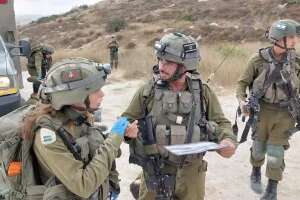
Bar entered Gaza on Oct. 31, leading a medical team. "I am here with another medical officer, a reservist doctor, three medics, and a team of Golani fighters – altogether 11 people. It's very crowded, especially for 60 hours at a time.
On Nov. 2, Bar's battalion commander, Lt. Col. Salman Habaka was killed.
"We could never imagine that something like this would happen so early in the fighting. Salman heard that the battalion next to us was ambushed, so he took his tank, and without thinking about the danger he drove there to help. He was later killed battling Hamas.
"It was said that he was killed, but we decided to get to him regardless. When we arrived, we were under fire, and for several hours we were not allowed to leave the tank. Only after we managed to stop the fire, toward the morning, did we manage to determine that Salman had indeed been killed."
Q: Who determined it?
"My fellow medical officer, B. Because I was very close with Salman, I preferred if B. did it. Not long before that, Salman celebrated his birthday, as did I, and we sent emotional greetings to each other. Before we entered Gaza, he called my husband, asked him how he was doing, and blessed us. Salman was such a special person. As a commander, he showed his greatness on Oct. 7, when within hours he arrived from the north to the invaded twins in the south and – immediately grasping the magnitude of the event – brought out tanks to fight, which is something that helped tip the scale in the IDF's favor.
"This is why I decided I should not be the one to determine his death. I felt I had to make sure I could keep going and provide medical treatment. There was no time to break down or mourn. But Salman is with me at all times, accompanying me in the fight. I still remember the last thing he told me: "To battle and victory, to battle and victory." Such was his spirit."
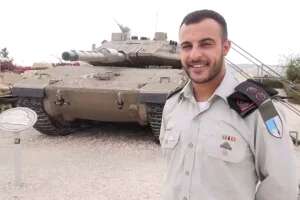
Another difficult event in which Bar participated occurred at an unexpected moment when her team arrived at a protected area to take a short rest, refuel, and stock up on food, water, and medical supplies.
For the first time since arriving in Gaza, Bar took off her ceramic vest on top of which was her medical equipment because the protected zone had its own medical team.
"I barely had time to open a can of tune, when suddenly someone shouted that a soldier was hit by a bullet. I grabbed the vest and immediately ran to the scene. In retrospect, I should not have taken it off.
"When I arrived, two doctors were treating a soldier who was wounded in the lower abdomen. They were working to stop the bleeding, and I and other medics focused on other areas. The soldier was conscious, I talked to him. He was in pain, so I gave him a sedative. He was also very stressed and told me he wasn't sure he would make it. I reassured him that he would be fine.
"He was treated by four doctors as well as a paramedic and medics, who had not worked together before, and yet worked in coordination. Everyone did their part, and we managed to stabilize the fighter. At the same time, we requested that he be urgently evacuated by a chopper. We realized that unless he was taken to a hospital soon, he might die. At the end of the day, one needs an operating room to stop such bleeding.
"The helicopter landed 200 meters [650 feet] away from us and we ran toward it with a stretcher. The brigade doctor updated me about the soldier's condition later and two days ago I called him myself. I had a very emotional conversation with him and his mother. He has already returned home. He was very fortunate that it happened in an area where there were so many doctors, so we all provided a quick response together."
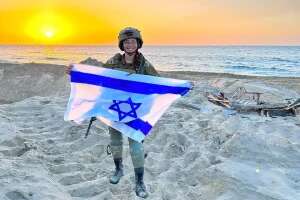
Q: And now that you're off duty for two days, how does it feel like being back in the relative routine of daily life in Israel?
"It was strange to get in my car and drive when only what feels like a second ago I was wearing a vest and a helmet and was under fire. But this is the mission, and in the end, when I come home, I also understand the "why": that the citizens, especially children, can walk around our country without fear because there are those who protect them and fight for them. When I am at home and there are no sirens, it's worth everything. The "why" is also to fight for the hostages to return home."
Q: And when in Gaza, were you always with the same team?
"No. Throughout the 28 days, the team I was with changed three times. I was the only one that stayed consistently. When I saw that they were running out of energy, I made a change. But for me, as someone who reports to the battalion commander, it was important to stay and continue to make decisions while being present in the field."
Q: And as a woman in the military, how does it make you feel that there are female soldiers held captive by Hamas?
"For me, it doesn't make a difference if it's a man or a woman, a civilian or a soldier. All of them need to return home."
Q: I'm sure that you are not immune to worries either.
"Of course. I suppose such thoughts flash through the minds of men as well. Before entering Gaza, there was fear, but I decided not to focus on that. I understand the dangers and know what I am doing, but this is my mission, and I will do it as best as I can, to make sure as many soldiers as possible will get to go back home."
Q: And are there moments of humor as well?
"Many. Once a soldier had to pee and could not leave the tank. So all that was left to do was laugh. But, of course, he has since been constantly reminded of that event, in good faith.
"We are very open with each other. In the end, we spend 24/7 together. But there are good experiences as well. For instance, when we got to the Gaza shore. It was exciting because that was one of the goals - to reach the sea. And we stayed there for a few days. Some of the medics found a beach umbrella and some chairs. And waving the Israeli flag while on the beach of Gaza was a significant and moving experience as well. ANd of course we took a picture and sent it to our parents."
Q: Speaking of parents, how are yours managing with you being on the front line?
"It's stressful. But they understand the meaning and the service, and they support me and worry for me, like every parent. My brother is also a soldier, in the Egoz unit, and luckily, the last time I was off duty, so was he and we managed to see each other."
Q: How about your spouse?
"We've been together for ten years. He was a part of all the decisions along the way and knew where he was getting into, even though he may not have understood exactly where this would lead. He is very supportive and proud of me. Without him, I couldn't have done it. At one point, when I was in Gaza, we did not meet for 40 days, and it was tough. We managed to talk a little on the phone. When we met, we hugged for minutes. But I am going back soon, so it's not over yet."
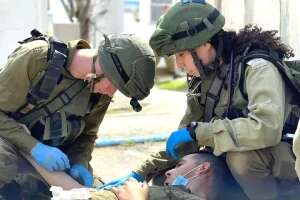
Staff Sgt. Ella, 24, from Modi'in, was in the final stages of moving to Jerusalem to study biomedicine at Hebrew University. After Oct. 7, she was called up for reserve duty. During her regular military service, Ella treated those wounded in car accidents and other medical emergencies, but only in Gaza did she provide treatment to soldiers while under fire.
She spent four weeks in the strip, with several breaks in between. Now she is back in Gaza again, in a tank.
"It's like the trunk of a car, you can't stand up, you can't fully lie down, and most of the time there is another fighter with me. All in all, there are five of us in the tank, four amazing fighters, it is a true privilege to be with them, and me, the paramedic."
Ella found herself in a complex situation when two combat engineers were seriously injured by a grenade.
"Our tank arrived there at the same time as the evacuation unit, which included a doctor as well. He took care of one of the wounded and I took care of the other. Both were urgent cases. We had to evacuate because everything occurred in a dangerous zone, with the forces and tanks providing cover for us. Everyone joined in to help and evacuate the injured. We learned a lot about different teams working together from that."
According to Ella, the two injured fighters got to the hospital in the nick of time.
"It's crazy to think that within 40 minutes they were already in the air. The commander of the evacuation unit handled it so well."
While evacuating the wounded to Israeli territory, Ella took the opportunity to call her parents and boyfriend.
"There were people there with cell phones, and I asked to make a call. Before I entered the Strip, I told my mother and my boyfriend that it was a matter of 48 hours, because that's what we were told. But the days passed, and I had no way of letting them know that I was okay. So they were really worried about me, and one phone call calmed them down."
Ella later treated two battalion commanders who were injured separately on the same day.
"We were the first to reach our battalion commander, who was wounded and needed to be evacuated immediately. I provided first aid and the evacuation team arrived and continued treating him until the chopper arrived. The next day, the battalion commander who replaced him was, unfortunately, also injured.
The next day, unfortunately, the Major General who replaced him was also injured. The SMP, who is in the tank with me, handled the incident masterfully, under fire. The deputy battalion commander, who was in the tank with me, handled the situation incredibly, all while under fire. He managed to bring our tank closer to the tank of the battalion commander, and when the two were connected, we moved him [the injured battalion commander] to the back of our tank.
"It's not easy to treat a wounded person inside a tank, there is not too much room. I had another soldier with me, who is not a medic, but earlier I had trained him to help me in such a situation. But when it came down to it, we did what we had to do, and turned out it was possible."
Ella ended up saving the battalion commander's life.
"He received good treatment, and the fighter who was by my side went above and beyond to help. Thank God, both battalion commanders are fine. I was especially excited to see that the first battalion commander had returned to activity already. The second one is also getting there."
Q: In such situations, do you ever get shocked?
"There is no time for shock or nerves. This is something we practice a lot during the long training. We are ready and know exactly how to start so that we don't get confused. There is definitely a lot of adrenaline. Before I entered Gaza, I had fears and uncertainties. It is not always easy, there are challenges on the way, but it's a sense of mission. I really understand the importance of what we do in Gaza, in particular, what the medical teams do.
"I'm also surrounded by amazing people, who are also funny. For the first three weeks, everyone was extremely stinky, so we made a lot of jokes about it."
Nevertheless, the situation remained serious as some of the fighters in Ella's tank had never seen such serious wounds in real life.
"After the soldiers saw me taking care of the wounded, it gave them a sense of security. They feel that if God forbid, something happens to them, there is someone here whose job it is to look after them. They suddenly trust me and know that they can consult me and come to me with any medical problem. In addition to treating the wounded, there are a lot of routine injuries – a broken finger or tense back, and I'm here to help with that too. The soldiers trust me and it gives me a lot of strength."
On the way to Gaza, Ella bore witness to the destruction Hamas inflicted on the towns bordering the enclave.
"We saw houses that had been burnt down and signs by the Zaka emergency services that take care of the bodies of the victims. It was a reminder of why we were doing what we were doing. It gave me a lot of motivation and strength to continue. School can wait. As long as the war continues, I'll be on reserve duty. The tremendous support from the Gaza periphery gives us all strength. They send us food and thank you notes all the time. We don't have room in the tank for everything! We get notes from children and in my pocket, I keep notes from my cousins. When we reentered Israeli territory to take a break, the residents begged us to use their homes for showers and anything we needed."
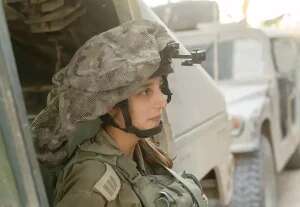
Capt. Shaked, 26, is a paramedic serving in the Jerusalem Brigade 6310. She is a second-year medical student studying in Beersheba, where she also works as a Magen David Adom paramedic.
On Oct. 7, she received three emergency calls.
"Soroka called to say they needed students because the operating rooms were overwhelmed. Magen David Adom called to ask for urgent 24-hour shifts. And I had already started packing when I was called up for reserve duty."
Shaked's boyfriend of four years, Alon, a water engineering student, also left at the same time to join the reserves.
"Alon is fighting in the north of Gaza, and I am in the center. We are not synchronized in our exits. He left Gaza for a short break while I remained, and now I am in Israel and he is there. We only spoke once, for a minute, in the past month. I hope the next time we go off duty at the same time."
Shaked entered the enclave with a battalion that crossed the border on foot carrying a weapon, a helmet a ceramic vest, and a large bag with medical equipment.
"It has everything needed for a small field hospital – medicine, equipment, respiratory equipment, weighing about 25 kilograms [55 pounds] in total.
Shaked fought in Gaza for two and a half weeks and provided life-saving care in three separate incidents.
"The medical squad, which includes me and a medic, is in the center of the forces that are divided into teams. We heard on the phone that a grenade went off in one of the buildings with one of the teams. At the same time, heavy fire from Kalashnikovs began. I was 50 meters [yards] away from the troops, and within a minute we got to the building while under fire. We found two wounded, one with shrapnel above the eye and in the leg, and the other with severe back pain from the blast.
"Together with the medics, we stopped the bleeding, treated the pain, and within 12 minutes we evacuated both of them on stretchers, on foot, to the meeting place with the evacuation team. Both are fine now. One is still hospitalized, and the other has been discharged from the hospital."
It wasn't the first time Shaked treated those wounded in war. As a paramedic during her regular military service, she treated wounded from Syria and in Judea and Samaria provided medical care while under fire.
"This time, of course, it's all on a much larger scale," she says.
"At the age of 6, I decided that I wanted to be a doctor, but I really wanted to be a fighter as well, so I decided to test my suitability and love for the field through the role of a combat paramedic. There is a different adrenaline in treating in a military uniform. Here, I take care of the people I know, who are like my second family now. When they are injured it is much more difficult. I feel that this is the greatest military challenge."
Another time, Shaked joined a small force that set out to thwart enemy operations, two kilometers [1.2 miles] away from the position of the main force.
"There was a sniper there. One of the fighters was hit, but thankfully in the arm, not anywhere critical. We immediately retreated to a safer place, and attended to the wound to make sure he fully recovered."
Shaked explained that she opted for a dressing that does not stop the blood flow to the limb because, on Oct. 7, 130 limbs were amputated due to arteries being blocked.
"Since the fighter was not evacuated by helicopter, I didn't know how soon he could get to a hospital, so we made an effort to save his limb. For me, the quality of life of the wounded is just as important as life itself."
The third incident involved a bomb explosion, and according to Shaked, one of the fighters was injured in the eye. She pulled the shrapnel out while in the field, which allowed the soldier to return to fighting.
"Two soldiers were cut by sharp metal, so we gave them stitches around the eye and nose in the field, and both of them stayed to fight. The morale of the soldiers is high. Even if someone leaves with a minor injury, within 24 hours he returns."
Q: As a woman, did you feel you need to prove yourself more?
"When I completed my regular service, I became a reserve paramedic. They got to know me and trust me. Gender doesn't usually matter in this case. They trust me and treat me as one of their own. I fight just like them."
Q: Did you manage to get any sleep at night?
"Not really. We wake up early, and we also do rounds every night. The sleep itself is not deep, because there is the noise of shelling and there is alertness. In the quiet moments, I also think a lot about Alon, I worry about him, because I'm sure he is in the same situation as I am."
Q: What about your parents?
"They have mixed feelings: they are both worried and proud of me. They are very connected to the task and know how much I love it. My mother is the queen of parcels, she sent me five of them in less than three weeks, with a special talent to get them anywhere. When I left [Gaza for a break in Israel] they came to pick me up, and of course, the first thing I ate was my mother's schnitzel."
Shaked's dream is to become a gynecologist. "The fighters laugh at me because there is not much chance of gaining experience in Gaza in this matter. I want to do something happy, bring life into the world. I really want to work in the delivery room. At the moment, medical studies are put aside until the war is over. As a future doctor, the war also gives me experience in the approach to patients and also in composure and dedication. It confirmed that this is what I really want to do."
Q: It's a major gap, between the front line and the delivery room.
"It was only when I went home that I realized how different the life of the soldiers in Gaza is. But our stay in Gaza is what makes life in Israel possible. Oct. 7 left a huge scar, and everyone understands very well that we must dismantle Hamas and return the hostages. I feel that we are a large orchestra of the people of Israel, soldiers as citizens, those outside, and those inside. I feel a sense of privilege and honor. I'm glad I went to Gaza. In the day and a half I've been at home I haven't stopped thinking about the fighters, and I already wanted to return."

